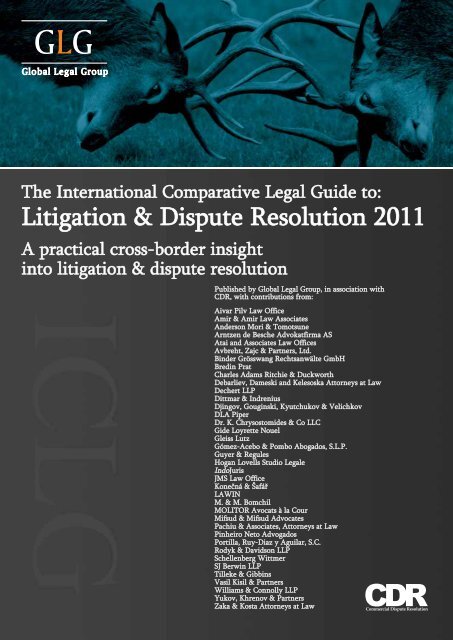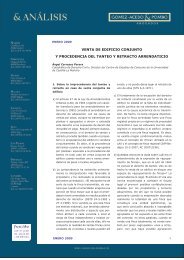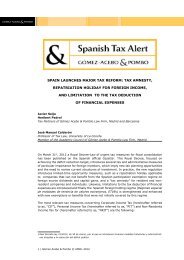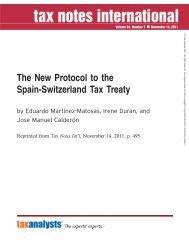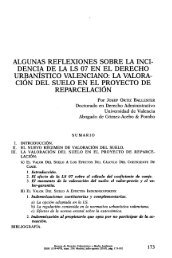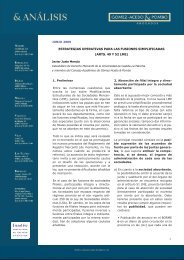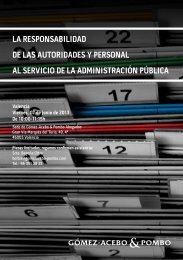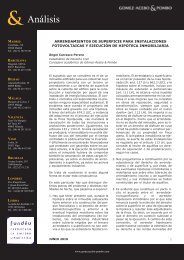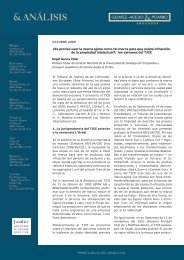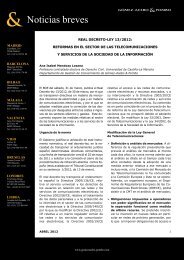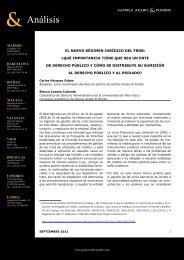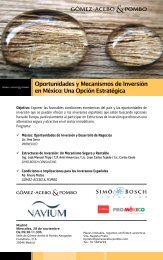the international comparative legal guide to litigation - dispute ...
the international comparative legal guide to litigation - dispute ...
the international comparative legal guide to litigation - dispute ...
You also want an ePaper? Increase the reach of your titles
YUMPU automatically turns print PDFs into web optimized ePapers that Google loves.
The International Comparative Legal Guide <strong>to</strong>:<br />
Litigation & Dispute Resolution 2011<br />
A practical cross-border insight<br />
in<strong>to</strong> <strong>litigation</strong> & <strong>dispute</strong> resolution<br />
Published by Global Legal Group, in association with<br />
CDR, with contributions from:<br />
Aivar Pilv Law Office<br />
Amir & Amir Law Associates<br />
Anderson Mori & Tomotsune<br />
Arntzen de Besche Advokatfirma AS<br />
Atai and Associates Law Offices<br />
Avbreht, Zajc & Partners, Ltd.<br />
Binder Grösswang Rechtsanwälte GmbH<br />
Bredin Prat<br />
Charles Adams Ritchie & Duckworth<br />
Debarliev, Dameski and Kelesoska At<strong>to</strong>rneys at Law<br />
Dechert LLP<br />
Dittmar & Indrenius<br />
Djingov, Gouginski, Kyutchukov & Velichkov<br />
DLA Piper<br />
Dr. K. Chrysos<strong>to</strong>mides & Co LLC<br />
Gide Loyrette Nouel<br />
Gleiss Lutz<br />
Gómez-Acebo & Pombo Abogados, S.L.P.<br />
Guyer & Regules<br />
Hogan Lovells Studio Legale<br />
IndoJuris<br />
JMS Law Office<br />
Konečná & Šafář<br />
LAWIN<br />
M. & M. Bomchil<br />
MOLITOR Avocats à la Cour<br />
Mifsud & Mifsud Advocates<br />
Pachiu & Associates, At<strong>to</strong>rneys at Law<br />
Pinheiro Ne<strong>to</strong> Advogados<br />
Portilla, Ruy-Diaz y Aguilar, S.C.<br />
Rodyk & Davidson LLP<br />
Schellenberg Wittmer<br />
SJ Berwin LLP<br />
Tilleke & Gibbins<br />
Vasil Kisil & Partners<br />
Williams & Connolly LLP<br />
Yukov, Khrenov & Partners<br />
Zaka & Kosta At<strong>to</strong>rneys at Law
Chapter 34<br />
Spain<br />
Diego Saavedra<br />
Gómez-Acebo & Pombo Abogados, S.L.P.<br />
Cristina Stampa<br />
I. LITIGATION<br />
1 Preliminaries<br />
1.1 What type of <strong>legal</strong> system has Spain got? Are <strong>the</strong>re any<br />
rules that govern civil procedure in Spain?<br />
Spain has a civil law system. The basic rule is <strong>the</strong> Spanish<br />
Constitution of 1978. Case law is paramount when it comes <strong>to</strong><br />
interpreting legislation and in many cases comes <strong>to</strong> fill <strong>the</strong> <strong>legal</strong><br />
loopholes.<br />
The main rule for <strong>the</strong> Spanish Judicial system is <strong>the</strong> Organic Act of<br />
Judicial Power No. 6/1985 (Ley Orgánica del Poder Judicial). The<br />
civil procedure is governed by <strong>the</strong> Civil Procedure Act No. 1/2000<br />
(Ley de Enjuiciamien<strong>to</strong> Civil), which became effective in January<br />
2001.<br />
1.2 How is <strong>the</strong> civil court system in Spain structured? What<br />
are <strong>the</strong> various levels of appeal and are <strong>the</strong>re any<br />
specialist courts?<br />
Apart from <strong>the</strong> courts called Justice’s Courts (Juzgados de Paz),<br />
which deal with minor <strong>dispute</strong>s (up <strong>to</strong> €90), <strong>the</strong> lower civil courts<br />
are <strong>the</strong> following:<br />
First Instance Courts (Juzgados de Primera Instancia),<br />
which hear all civil matters in first instance except for those<br />
reserved <strong>to</strong> <strong>the</strong> specialised courts.<br />
Commercial Courts (Juzgados de lo Mercantil), specialised<br />
courts <strong>to</strong> deal with insolvencies and <strong>dispute</strong>s involving<br />
corporate affairs, unfair competition, Intellectual Property,<br />
Maritime and Transports Law, among o<strong>the</strong>rs.<br />
The Provincial Courts (Audiencias Provinciales), in <strong>the</strong> capital of<br />
each Province, hear <strong>the</strong> appeals against lower courts’ decisions.<br />
The civil chambers of <strong>the</strong> Higher Courts of Justice (Tribunales<br />
Superiores de Justicia) deal with, in each of <strong>the</strong> regions of Spain,<br />
applications for review of <strong>the</strong> Provincial Courts’ decisions affecting<br />
<strong>the</strong>ir own regional civil law. The Civil Procedure Act (CPA) grants<br />
<strong>the</strong>se Tribunals <strong>the</strong> power <strong>to</strong> hear, as well appeal against, <strong>the</strong><br />
Provincial Courts’ decisions based on breach of process, but this<br />
requires an additional new regulation not yet enacted. Meanwhile,<br />
<strong>the</strong> Supreme Court hears <strong>the</strong>se appeals.<br />
The civil chamber of <strong>the</strong> Supreme Court, located in Madrid, is<br />
<strong>the</strong> head of our civil judicial system. It hears <strong>the</strong> applications for<br />
review of <strong>the</strong> judgments issued by <strong>the</strong> Provincial Courts based on<br />
breach of law in certain narrow circumstances.<br />
The Constitutional Tribunal, located in Madrid, retains <strong>the</strong><br />
highest power <strong>to</strong> interpret <strong>the</strong> Constitution.<br />
1.3 What are <strong>the</strong> main stages in civil proceedings in Spain?<br />
What is <strong>the</strong>ir underlying timeframe?<br />
The CPA establishes two main kinds of proceedings: Ordinary and<br />
Oral proceedings. Whereas <strong>the</strong> Ordinary proceeding covers <strong>the</strong><br />
most common commercial <strong>dispute</strong>s and those involving an amount<br />
above €6,000, <strong>the</strong> Oral proceeding is reserved for certain matters<br />
such as eviction and <strong>dispute</strong>s involving a lesser amount.<br />
Roughly, <strong>the</strong> Ordinary procedure compromises <strong>the</strong> following<br />
stages:<br />
The claim, which is required <strong>to</strong> contain <strong>the</strong> full statement of<br />
claim.<br />
The court will examine its own jurisdiction and competence<br />
and order <strong>the</strong> service of <strong>the</strong> procedure on <strong>the</strong> defendant. This<br />
stage can last for some 2 months.<br />
The response must be filed by <strong>the</strong> defendant, as a full<br />
statement of defence, in <strong>the</strong> 20 days after <strong>the</strong> service of<br />
process. Never<strong>the</strong>less, <strong>the</strong> respondent may in <strong>the</strong> first 10<br />
days challenge <strong>the</strong> jurisdiction of <strong>the</strong> court, on which <strong>the</strong><br />
court must decide after hearing <strong>the</strong> claimant.<br />
Pre-trial hearing, <strong>to</strong> which <strong>the</strong> court summons <strong>the</strong> parties<br />
upon receipt of <strong>the</strong> response, and usually takes place within<br />
<strong>the</strong> subsequent four <strong>to</strong> eight months. The main object of this<br />
hearing is, among o<strong>the</strong>rs: (i) <strong>to</strong> decide on any procedural<br />
matters that would prevent <strong>the</strong> process from continuing; (ii)<br />
<strong>to</strong> determine <strong>the</strong> facts in discussion; and (iii) <strong>to</strong> decide on <strong>the</strong><br />
parties’ proposal of evidence <strong>to</strong> be produced.<br />
Trial, on <strong>the</strong> date that has been fixed at <strong>the</strong> pre-trial hearing,<br />
usually takes place in <strong>the</strong> subsequent four <strong>to</strong> eight months.<br />
At <strong>the</strong> trial, witness and expert testimonies take place and <strong>the</strong><br />
parties present <strong>the</strong>ir oral conclusions on <strong>the</strong> case.<br />
Sentence, which puts an end <strong>to</strong> <strong>the</strong> first instance. The CPA<br />
establishes that <strong>the</strong> judgment must be rendered 20 days after<br />
<strong>the</strong> trial, although in practice this period is extended <strong>to</strong> some<br />
two <strong>to</strong> four months depending on <strong>the</strong> workload of <strong>the</strong> court.<br />
The Oral proceeding is simpler than <strong>the</strong> Ordinary one. Once <strong>the</strong><br />
claim is filed, <strong>the</strong> judge examines <strong>the</strong> procedural aspects and fixes<br />
<strong>the</strong> date for <strong>the</strong> trial. It <strong>the</strong>n serves process <strong>to</strong> <strong>the</strong> defendant who<br />
produces his answer <strong>to</strong> <strong>the</strong> claim orally at <strong>the</strong> trial, where <strong>the</strong><br />
witnesses and experts are examined. The judge should hand down<br />
its decision in <strong>the</strong> following 10 days.<br />
254<br />
WWW.ICLG.CO.UK<br />
ICLG TO: LITIGATION & DISPUTE RESOLUTION 2011<br />
© Published and reproduced with kind permission by Global Legal Group Ltd, London
Gómez-Acebo & Pombo Abogados, S.L.P.<br />
Spain<br />
1.4 What is Spain’s local judiciary’s approach <strong>to</strong> exclusive<br />
jurisdiction clauses?<br />
Courts take a favourable approach <strong>to</strong> exclusive jurisdiction clauses<br />
and may of <strong>the</strong>ir own motion, as a matter of law and in certain<br />
circumstances, end proceedings when <strong>the</strong>y lack jurisdiction in <strong>the</strong>se<br />
fields or deny <strong>the</strong> enforcement when <strong>the</strong> court of origin has<br />
breached an exclusive jurisdiction clause.<br />
1.5 What are <strong>the</strong> costs of civil court proceedings in Spain.<br />
Who bears <strong>the</strong>se costs?<br />
The parties’ main costs are <strong>the</strong> at<strong>to</strong>rneys’ fees, <strong>the</strong> rights of <strong>the</strong><br />
Procuradores (who act as agents before <strong>the</strong> court on behalf of a<br />
party), <strong>the</strong> experts’ fees and expenses and <strong>the</strong> judicial tax.<br />
The at<strong>to</strong>rney and <strong>the</strong> client may agree freely on <strong>the</strong> fee structure,<br />
although each Bar Association publishes some orientations that are<br />
generally respected. The rights of <strong>the</strong> Procuradores are calculated<br />
in accordance <strong>to</strong> a fixed scale, based on <strong>the</strong> amount in <strong>dispute</strong> and<br />
<strong>the</strong> acts performed before <strong>the</strong> court. The judicial tax, where<br />
applicable, is a relatively small amount, and must generally be paid<br />
when filing a claim.<br />
Costs may be recoverable by <strong>the</strong> prevailing party if <strong>the</strong> Judge so<br />
decides in <strong>the</strong> judgment under certain rules. The judicial<br />
assessment normally does not cover all <strong>the</strong> costs incurred.<br />
1.6 Are <strong>the</strong>re any particular rules about funding <strong>litigation</strong> in<br />
Spain? Are contingency fee/conditional fee arrangements<br />
permissible? What are <strong>the</strong> rules pertaining <strong>to</strong> security for<br />
costs?<br />
Our <strong>legal</strong> system guarantees that people without financial means<br />
obtain access <strong>to</strong> a lawyer paid by <strong>the</strong> State. However, this situation<br />
is rare in commercial <strong>dispute</strong>s.<br />
“No win, no fee” arrangements are not allowed in <strong>the</strong> Bar rules,<br />
though <strong>the</strong> client and <strong>the</strong> lawyer may agree that part of <strong>the</strong> fees<br />
depend upon <strong>the</strong> result of <strong>the</strong> procedure. However, both <strong>the</strong><br />
competition authorities and <strong>the</strong> Supreme Court recently questioned<br />
and ruled against this prohibition so now parties may, in principle,<br />
enter in<strong>to</strong> a contingency fee agreement.<br />
There are no special rules on security for costs in <strong>the</strong> Spanish <strong>legal</strong><br />
system, leaving <strong>the</strong> issue open <strong>to</strong> <strong>the</strong> general regime of interim<br />
relief. However, in practice, this sort of issue is rare.<br />
2 Before Commencing Proceedings<br />
2.1 Is <strong>the</strong>re any particular formality with which you must<br />
comply before you initiate proceedings?<br />
different actions, and some of <strong>the</strong>m are different depending on <strong>the</strong><br />
regional law <strong>to</strong> apply. Corporate or certain commercial <strong>dispute</strong>s<br />
also have <strong>the</strong>ir own statutes of limitation, some of which are<br />
extremely short.<br />
The term for general contractual claims is 15 years, whereas for <strong>to</strong>rt<br />
claims it is 1 year.<br />
The start of <strong>the</strong> period depends on <strong>the</strong> kind of action, but a general<br />
rule is that it starts from <strong>the</strong> moment that it could be brought before<br />
<strong>the</strong> courts. Also, in civil law, time periods are counted in terms of<br />
natural days, i.e., <strong>the</strong>y includes festivities and bank holidays.<br />
Time limits are treated as a substantive law issue in our <strong>legal</strong><br />
system. The existence of a statute of limitation has <strong>to</strong> be alleged in<br />
<strong>the</strong> response, and should be decided upon in <strong>the</strong> final judgment.<br />
3 Commencing Proceedings<br />
3.1 How are civil proceedings commenced (issued and<br />
served) in Spain? What various means of service are<br />
<strong>the</strong>re? What is <strong>the</strong> deemed date of service? How is<br />
service effected outside Spain? Is <strong>the</strong>re a preferred<br />
method of service of foreign proceedings in Spain?<br />
Civil proceedings commence with a claim that must be filed by <strong>the</strong><br />
claimant. This claim is a full statement of claim and must be filed<br />
<strong>to</strong>ge<strong>the</strong>r with all <strong>the</strong> documents in support <strong>the</strong>reof.<br />
The litis pendens exists as of <strong>the</strong> date of filing, provided <strong>the</strong> claim<br />
is <strong>the</strong>reafter admitted for procedure.<br />
Service is performed by court officers. In general, service is<br />
performed through personal service <strong>to</strong> <strong>the</strong> respondent. If <strong>the</strong><br />
respondent is not found in <strong>the</strong> domicile provided by <strong>the</strong> claimant<br />
and no o<strong>the</strong>r domicile is known in <strong>the</strong> public records, service may<br />
be ultimately performed by <strong>the</strong> publication of notices in official<br />
State gazettes.<br />
The deemed date of service is that on which <strong>the</strong>re is evidence that<br />
<strong>the</strong> personal delivery was made, or proof of <strong>the</strong> refusal by <strong>the</strong><br />
defendant <strong>to</strong> receive <strong>the</strong> service, or <strong>the</strong> date on which <strong>the</strong> notice was<br />
published in official gazettes.<br />
For <strong>international</strong> service, Spain is a party <strong>to</strong> <strong>the</strong> 1965 Hague<br />
Convention on <strong>the</strong> Service Abroad of Judicial and Extra-judicial<br />
Documents in Civil and Commercial Matters. For service within<br />
EU countries, <strong>the</strong> EC Regulation 1,393/2007 on <strong>the</strong> service in <strong>the</strong><br />
Member States of judicial and extrajudicial documents in civil or<br />
commercial matters applies.<br />
The preferred method of service is personal service, although any<br />
method regulated in <strong>the</strong>se Conventions that allows for <strong>the</strong><br />
determination of <strong>the</strong> content and date of delivery is valid, provided<br />
it is not incompatible with Spanish public policy.<br />
Spain<br />
There is no compulsory formality that parties have <strong>to</strong> follow before<br />
initiating proceedings. However, it is usual that <strong>the</strong>y try <strong>to</strong> reach an<br />
amicable settlement before resorting <strong>to</strong> <strong>the</strong> courts.<br />
There are as well certain rules that allow a party <strong>to</strong> prepare a <strong>legal</strong><br />
claim in cases where <strong>the</strong> identity of <strong>the</strong> respondent is ignored or<br />
where <strong>the</strong> exhibition of a document is essential <strong>to</strong> prepare <strong>the</strong> claim.<br />
2.2 What limitation periods apply <strong>to</strong> different classes of claim<br />
for <strong>the</strong> bringing of proceedings before your civil courts?<br />
How are <strong>the</strong>y calculated? Are time limits treated as a<br />
substantive or procedural law issue?<br />
There are many different limitation periods in Spanish law for<br />
ICLG TO: LITIGATION & DISPUTE RESOLUTION 2011<br />
© Published and reproduced with kind permission by Global Legal Group Ltd, London<br />
3.2 Are any pre-action interim remedies available in Spain?<br />
How do you apply for <strong>the</strong>m? What are <strong>the</strong> main criteria for<br />
obtaining <strong>the</strong>se?<br />
The claimant may request interim measures before or at <strong>the</strong> time of<br />
starting proceedings.<br />
This is done through a statement of claim, which must include <strong>the</strong><br />
relevant documents in support of <strong>the</strong> measures sought. The<br />
competent court may adopt <strong>the</strong> measures with or without an<br />
audience <strong>to</strong> <strong>the</strong> respondent. Interim relief is granted only in<br />
exceptional cases.<br />
The main criteria for granting <strong>the</strong> measures are:<br />
Periculum in mora (danger in delay): that is, that waiting<br />
WWW.ICLG.CO.UK<br />
255
Gómez-Acebo & Pombo Abogados, S.L.P.<br />
Spain<br />
Spain<br />
for <strong>the</strong> judgment without adopting <strong>the</strong> measure might<br />
provoke that <strong>the</strong> relief sought in <strong>the</strong> main proceeding will no<br />
longer be of any use <strong>to</strong> <strong>the</strong> claimant.<br />
Fumus boni iuris: a prima facie impression that <strong>the</strong> claimant<br />
has presented evidence that leads <strong>to</strong> <strong>the</strong> thought that <strong>the</strong> main<br />
action is likely <strong>to</strong> succeed in <strong>the</strong> future.<br />
Caution: <strong>the</strong> court only grants interim relief at <strong>the</strong> risk of <strong>the</strong><br />
petitioner, and <strong>the</strong>reby requests that a sufficient caution is<br />
established <strong>to</strong> cover eventual damages if <strong>the</strong> main case is<br />
later dismissed or <strong>the</strong> interim relief is revoked.<br />
3.3 What are <strong>the</strong> main elements of <strong>the</strong> claimant’s pleadings?<br />
The statement of claim must include:<br />
The names and addresses of <strong>the</strong> parties.<br />
The facts of <strong>the</strong> <strong>dispute</strong>, and all <strong>the</strong> documents that prove<br />
such facts, provided <strong>the</strong> claimant had access <strong>to</strong> <strong>the</strong>m.<br />
The <strong>legal</strong> grounds, whe<strong>the</strong>r <strong>the</strong>y are laws, regulations or case<br />
law, on which <strong>the</strong> claimant bases <strong>the</strong> claim.<br />
The compliance with all <strong>the</strong> procedural requirements.<br />
The relief sought. If it consists of <strong>the</strong> payment of a sum, this<br />
must be clearly quantified.<br />
3.4 Can <strong>the</strong> pleadings be amended? If so, are <strong>the</strong>re any<br />
restrictions?<br />
The object of a claim cannot be amended once it has been served on<br />
<strong>the</strong> o<strong>the</strong>r party and <strong>the</strong> response or counterclaim has been filed<br />
(pursuant <strong>to</strong> <strong>the</strong> prohibition of <strong>the</strong> mutatio libelli principle).<br />
Despite this, in view of <strong>the</strong> statement of defence, slight changes or<br />
complimentary arguments may be introduced in <strong>the</strong> pre-trial<br />
hearing (in <strong>the</strong> Ordinary proceeding) or in <strong>the</strong> hearing (in <strong>the</strong> Oral<br />
proceeding). However, <strong>the</strong> claimant cannot introduce new petitions<br />
at this stage unless <strong>the</strong> adverse party agrees or if <strong>the</strong> court rules that<br />
it doesn’t affect <strong>the</strong> right of defence of <strong>the</strong> defendant.<br />
4 Defending a Claim<br />
4.1 What are <strong>the</strong> main elements of a statement of defence?<br />
Can <strong>the</strong> defendant bring counterclaims/claim or defence<br />
of set-off?<br />
The defendant must include in <strong>the</strong> statement:<br />
What facts of <strong>the</strong> claim are acknowledged or denied.<br />
The defendant’s own version of <strong>the</strong> facts and <strong>the</strong> documents<br />
in support of such version.<br />
What decision it understands <strong>the</strong> court should issue,<br />
generally <strong>the</strong> absolution of <strong>the</strong> defendant.<br />
The defendant can bring a counterclaim, but only if it can be<br />
decided in <strong>the</strong> same kind of proceeding and before <strong>the</strong> same type of<br />
court that is handling <strong>the</strong> main claim. The counterclaim can be<br />
directed against o<strong>the</strong>r parties as well.<br />
The defendant may also bring a defence of set-off, even if it only<br />
seeks its own absolution.<br />
In <strong>the</strong>se cases <strong>the</strong> claimant, as well as <strong>the</strong> rest of <strong>the</strong> parties against<br />
whom <strong>the</strong> counterclaim is directed, may file a statement of defence<br />
in 20 working days from <strong>the</strong> day of service.<br />
4.2 What is <strong>the</strong> time limit within which <strong>the</strong> statement of<br />
defence has <strong>to</strong> be served?<br />
The defendant must file <strong>the</strong> statement of defence at court 20<br />
working days after <strong>the</strong> service of process.<br />
4.3 Is <strong>the</strong>re a mechanism in your civil justice system whereby<br />
a defendant can pass on liability by bringing an action<br />
against a third party?<br />
The defendant may, in <strong>the</strong> same period available <strong>to</strong> file its statement<br />
of defence, ask for ano<strong>the</strong>r party <strong>to</strong> take part as defendant. If <strong>the</strong><br />
court admits <strong>the</strong> petition of <strong>the</strong> defendant after hearing <strong>the</strong> claimant,<br />
<strong>the</strong> statement of claim will be served on <strong>the</strong> new defendant. Once<br />
this new defendant has filed its statement of defence, <strong>the</strong> original<br />
defendant might ask that <strong>the</strong> latter is put in its place as a sole<br />
defendant. The claimant and <strong>the</strong> new defendant will be heard, and<br />
<strong>the</strong>n <strong>the</strong> court will decide.<br />
4.4 What happens if <strong>the</strong> defendant does not defend <strong>the</strong><br />
claim?<br />
If <strong>the</strong> defendant does not file <strong>the</strong> statement of defence within <strong>the</strong> given<br />
period, <strong>the</strong> court will declare <strong>the</strong> default of appearance and <strong>the</strong> process<br />
will continue without its participation. This will not be deemed as<br />
surrender or an acknowledgment of <strong>the</strong> facts, and <strong>the</strong> claimant will<br />
still have <strong>the</strong> burden <strong>to</strong> prove <strong>the</strong> facts on which its claim relies.<br />
The declaration of default of appearance must be served on <strong>the</strong><br />
defendant, announcing that no o<strong>the</strong>r act will be served except <strong>the</strong><br />
final judgment.<br />
4.5 Can <strong>the</strong> defendant <strong>dispute</strong> <strong>the</strong> court’s jurisdiction?<br />
The defendant may challenge <strong>the</strong> court’s terri<strong>to</strong>rial jurisdiction (<strong>the</strong><br />
competent courts are located in ano<strong>the</strong>r place) or its material<br />
jurisdiction (<strong>the</strong> competent courts are o<strong>the</strong>r due <strong>to</strong> <strong>the</strong> matter in<br />
<strong>dispute</strong>). The defendant may challenge <strong>the</strong> court’s jurisdiction if<br />
<strong>the</strong>re is an arbitration clause.<br />
The challenge must be filed within 10 days of <strong>the</strong> service of process<br />
and has <strong>the</strong> effect of staying <strong>the</strong> procedure until <strong>the</strong> court issues a<br />
decision.<br />
5 Joinder & Consolidation<br />
5.1 Is <strong>the</strong>re a mechanism in your civil justice system whereby<br />
a third party can be joined in<strong>to</strong> ongoing proceedings in<br />
appropriate circumstances? If so, what are those<br />
circumstances?<br />
Apart from what has been explained in question 4.3, a party that<br />
considers having a legitimate interest in <strong>the</strong> result of <strong>the</strong> proceeding<br />
may file a petition <strong>to</strong> join <strong>the</strong> proceeding ei<strong>the</strong>r as a claimant or<br />
defendant. The court will decide after hearing <strong>the</strong> rest of <strong>the</strong> parties.<br />
If <strong>the</strong> court allows <strong>the</strong> new party <strong>to</strong> join <strong>the</strong> proceeding, <strong>the</strong> joinder<br />
may only do what <strong>the</strong> CPA allows as of <strong>the</strong> moment it joined <strong>the</strong><br />
proceeding, i.e., <strong>the</strong> proceeding will not be taken back.<br />
5.2 Does your civil justice system allow for <strong>the</strong> consolidation<br />
of two sets of proceedings in appropriate circumstances?<br />
If so, what are those circumstances?<br />
Pursuant <strong>to</strong> <strong>the</strong> CPA, <strong>the</strong> parties may request <strong>the</strong> consolidation of<br />
256<br />
WWW.ICLG.CO.UK<br />
ICLG TO: LITIGATION & DISPUTE RESOLUTION 2011<br />
© Published and reproduced with kind permission by Global Legal Group Ltd, London
Gómez-Acebo & Pombo Abogados, S.L.P.<br />
Spain<br />
two different proceedings if <strong>the</strong>y are closely linked, in such a way<br />
that <strong>the</strong> decision on one of <strong>the</strong>m might have pre-trial effects on <strong>the</strong><br />
o<strong>the</strong>r one or if <strong>the</strong> decisions in both proceedings could be<br />
contradic<strong>to</strong>ry or incompatible. The petition of consolidation must<br />
be filed before <strong>the</strong> court that is hearing <strong>the</strong> most ancient proceeding<br />
and said court will be competent <strong>to</strong> hear <strong>the</strong> consolidated<br />
proceeding.<br />
For a court <strong>to</strong> allow this consolidation, both claims must be<br />
followed in <strong>the</strong> first instance, and under <strong>the</strong> same type of<br />
proceeding (Ordinary or Oral).<br />
5.3 Do you have split trials/bifurcation of proceedings?<br />
If <strong>the</strong> claimant has consolidated two or more actions in its initial<br />
claim in a case in which <strong>the</strong> consolidation was not permitted by law,<br />
<strong>the</strong> court will grant a term <strong>to</strong> correct this before resuming <strong>the</strong><br />
proceedings or will terminate <strong>the</strong> process.<br />
The defendant may as well oppose in its statement of defence that<br />
<strong>the</strong> actions have been wrongly consolidated, in which case <strong>the</strong> court<br />
will decide in <strong>the</strong> pre-trial hearing (in <strong>the</strong> Ordinary procedure) or in<br />
<strong>the</strong> hearing (in <strong>the</strong> Oral procedure) which action or actions can<br />
continue in <strong>the</strong> proceedings.<br />
6 Duties & Powers of <strong>the</strong> Courts<br />
6.1 Is <strong>the</strong>re any particular case allocation system before <strong>the</strong><br />
civil courts in Spain? How are cases allocated?<br />
Yes, <strong>the</strong> Superior Council of <strong>the</strong> Judicial Power publishes <strong>the</strong><br />
Allocation Rules for <strong>the</strong> different courts and Tribunals <strong>to</strong> ensure <strong>the</strong><br />
correct assignment of <strong>the</strong> cases and <strong>the</strong> fair distribution of <strong>the</strong><br />
workload.<br />
Generally, <strong>the</strong> cases are distributed <strong>to</strong> <strong>the</strong> different courts by <strong>the</strong><br />
Dean Court of each judicial unit, in accordance <strong>to</strong> such rules. The<br />
rules generally set forth <strong>the</strong> allocation depending on <strong>the</strong> subject<br />
matter and <strong>the</strong> type of procedure, and distribute <strong>the</strong> cases by <strong>the</strong><br />
order of entry at <strong>the</strong> Registry.<br />
6.2 Do <strong>the</strong> courts in Spain have any particular case<br />
management powers? What interim applications can <strong>the</strong><br />
parties make? What are <strong>the</strong> cost consequences?<br />
No. The general principle is that parties have <strong>the</strong> disposition over<br />
<strong>the</strong> object of <strong>the</strong> procedure, and may renounce, withdraw, surrender<br />
or transact on <strong>the</strong> object of <strong>the</strong> case, always within <strong>the</strong> limits set<br />
forth by <strong>the</strong> CPA. Parties may also jointly suspend <strong>the</strong> course of <strong>the</strong><br />
procedure. Courts cannot overrule or decide out of <strong>the</strong> scope<br />
defined by <strong>the</strong> parties.<br />
Outside this faculty of <strong>the</strong> parties, <strong>the</strong> courts must respect <strong>the</strong> rules<br />
of process established in <strong>the</strong> CPA.<br />
Parties are free <strong>to</strong> request interim relief before or during <strong>the</strong> course<br />
of <strong>the</strong> procedure, as well as measures <strong>to</strong> secure and anticipate<br />
evidence in certain circumstances.<br />
Each incident, request for interim relief or o<strong>the</strong>rwise separate<br />
petition may be subject <strong>to</strong> separate orders <strong>to</strong> bear costs.<br />
6.3 What sanctions are <strong>the</strong> courts in Spain empowered <strong>to</strong><br />
impose on a party that disobeys <strong>the</strong> court’s orders or<br />
directions?<br />
A court may order a party <strong>to</strong> pay a fine of up <strong>to</strong> €6,000 if it finds<br />
that it has acted against <strong>the</strong> rules of good faith in <strong>the</strong> scope of <strong>the</strong><br />
procedure. A court may also inform <strong>the</strong> Bar Association in case an<br />
at<strong>to</strong>rney’s action may be <strong>the</strong> object of a disciplinary sanction.<br />
The CPA also contains specific consequences for disobedience in<br />
o<strong>the</strong>r stages of <strong>the</strong> process, such as, for example, certain orders<br />
during <strong>the</strong> enforcement phase.<br />
6.4 Do <strong>the</strong> courts in Spain have <strong>the</strong> power <strong>to</strong> strike out part of<br />
a statement of case? If so, in what circumstances?<br />
No. The court must decide each case based on <strong>the</strong> facts, evidence<br />
and petition of <strong>the</strong> parties. However, courts may exceptionally<br />
reject a petition that is produced with manifest abuse of right,<br />
although this power is seldom used.<br />
6.5 Can <strong>the</strong> civil courts in Spain enter summary judgment?<br />
No, in case of <strong>the</strong> default of appearance of <strong>the</strong> respondent, <strong>the</strong><br />
procedure will continue and <strong>the</strong> court will still require <strong>the</strong> claimant<br />
<strong>to</strong> provide sufficient evidence in support of its position.<br />
However, <strong>the</strong>re is a specific procedure for debt recovery that is<br />
monetary, due and exigible in a maximum amount of €250,000. In<br />
this procedure (proceso moni<strong>to</strong>rio), <strong>the</strong> court may issue a default<br />
judgment based on <strong>the</strong> default of appearance of <strong>the</strong> deb<strong>to</strong>r, provided<br />
certain requirements are met.<br />
For cases in which at least one of <strong>the</strong> parties is domiciled or<br />
habitually resident in a Member State o<strong>the</strong>r than <strong>the</strong> Member State<br />
of <strong>the</strong> competent court, and with no maximum amount, parties may<br />
ask for a European order for payment <strong>to</strong> be issued, pursuant <strong>to</strong> <strong>the</strong><br />
EC Regulation 1896/2006 creating a European order for payment<br />
procedure. If <strong>the</strong> Judge declares <strong>the</strong> default of appearance of <strong>the</strong><br />
deb<strong>to</strong>r, it will immediately declare such European order for<br />
payment enforceable as well.<br />
Also, a court may issue a partial order on certain points of <strong>the</strong> claim<br />
if parties have so agreed or if <strong>the</strong> respondent has partially<br />
surrendered <strong>to</strong> <strong>the</strong> claim.<br />
6.6 Do <strong>the</strong> courts in Spain have any powers <strong>to</strong> discontinue or<br />
stay <strong>the</strong> proceedings? If so, in what circumstances?<br />
No, unless <strong>the</strong> parties have so requested jointly.<br />
7 Disclosure<br />
7.1 What are <strong>the</strong> basic rules of disclosure in civil proceedings<br />
in Spain? Are <strong>the</strong>re any classes of documents that do not<br />
require disclosure?<br />
There is no such procedure in Spain as <strong>the</strong> disclosure of <strong>the</strong><br />
common law system.<br />
In Spain, parties are only obliged <strong>to</strong> produce <strong>the</strong> documents that are<br />
in support of <strong>the</strong>ir positions.<br />
However, any party may request <strong>the</strong> o<strong>the</strong>r <strong>to</strong> produce a determined<br />
document, provided it can produce a copy <strong>the</strong>reof or an indication<br />
as exact as possible of <strong>the</strong> said document. The unjustified inability<br />
<strong>to</strong> produce such document allows <strong>the</strong> court <strong>to</strong> ei<strong>the</strong>r deem as<br />
evidence <strong>the</strong> copy or indications <strong>the</strong>reof or <strong>to</strong> issue an order<br />
compelling <strong>the</strong> party <strong>to</strong> produce <strong>the</strong> required document.<br />
Spain<br />
ICLG TO: LITIGATION & DISPUTE RESOLUTION 2011<br />
© Published and reproduced with kind permission by Global Legal Group Ltd, London<br />
WWW.ICLG.CO.UK<br />
257
Gómez-Acebo & Pombo Abogados, S.L.P.<br />
Spain<br />
Spain<br />
7.2 What are <strong>the</strong> rules on privilege in civil proceedings in<br />
Spain?<br />
There are no specific rules on privilege; this has <strong>to</strong> be determined<br />
on a case-by-case basis. The in-house counsel, however, enjoys a<br />
privilege based on <strong>the</strong> Bar Association Rules.<br />
7.3 What are <strong>the</strong> rules in Spain with respect <strong>to</strong> disclosure by<br />
third parties?<br />
A court may only order a third party <strong>to</strong> disclose a document if it is<br />
transcendental <strong>to</strong> <strong>the</strong> purpose of issuing <strong>the</strong> judgment. The court<br />
will decide on this at <strong>the</strong> petition of a party, upon hearing <strong>the</strong><br />
affected third party.<br />
The public entities have <strong>the</strong> obligation <strong>to</strong> disclose a document upon<br />
<strong>the</strong> request of a court unless such document is declared or classified<br />
as reserved or a secret.<br />
7.4 What is <strong>the</strong> court’s role in disclosure in civil proceedings<br />
in Spain?<br />
The court has <strong>to</strong> decide, upon <strong>the</strong> petition of a party, whe<strong>the</strong>r <strong>the</strong><br />
disclosure of a document is accepted or not and whe<strong>the</strong>r it issues an<br />
order for a party <strong>to</strong> disclose <strong>the</strong> document or not.<br />
Reproduction of words, sounds or images.<br />
8.3 Are <strong>the</strong>re any particular rules regarding <strong>the</strong> calling of<br />
witnesses of fact? The making of witness statements or<br />
depositions?<br />
Witness testimonies take place orally before <strong>the</strong> court at <strong>the</strong> trial.<br />
Case law has established that witness statements are not receivable<br />
as witness testimonies because <strong>the</strong>y do not allow <strong>the</strong> crossexamination<br />
of <strong>the</strong> witnesses. Witness depositions are not available<br />
in Spain. However, under certain circumstances, a witness may<br />
exceptionally declare before a different court.<br />
8.4 What is <strong>the</strong> court’s role in <strong>the</strong> parties’ provision of<br />
evidence in civil proceedings in Spain?<br />
Courts must decide on whe<strong>the</strong>r <strong>the</strong> means of evidence proposed by<br />
<strong>the</strong> parties are relevant for <strong>the</strong> case and are <strong>the</strong>reby accepted. If<br />
rejected, <strong>the</strong> evidence is not produced in <strong>the</strong> procedure. In this case,<br />
<strong>the</strong> affected party may reiterate its request <strong>to</strong> produce <strong>the</strong> evidence<br />
in its appeal against <strong>the</strong> final judgment.<br />
Courts may not request <strong>the</strong> production of any means of evidence of<br />
its own motion and must decide on <strong>the</strong> case based solely on <strong>the</strong><br />
evidence actually produced in <strong>the</strong> procedure by <strong>the</strong> parties.<br />
7.5 Are <strong>the</strong>re any restrictions on <strong>the</strong> use of documents<br />
obtained by disclosure in Spain?<br />
The CPA does not contain any restriction or limitation <strong>to</strong> <strong>the</strong> use of<br />
a document obtained from a judicial process.<br />
8 Evidence<br />
8.1 What are <strong>the</strong> basic rules of evidence in Spain?<br />
The claimant must produce any documents in support of its position<br />
<strong>to</strong>ge<strong>the</strong>r with <strong>the</strong> initial complaint. It will not be able <strong>to</strong> produce<br />
fur<strong>the</strong>r documents at a later stage (this has some exceptions).<br />
Expert reports must also be enclosed with or announced in <strong>the</strong><br />
initial written submissions.<br />
Any o<strong>the</strong>r means of evidence is proposed by <strong>the</strong> parties and<br />
accepted or rejected by <strong>the</strong> court at <strong>the</strong> pre-trial hearing, <strong>the</strong> main<br />
object of which is <strong>the</strong> determination of <strong>the</strong> evidence that will be<br />
produced at <strong>the</strong> trial or in <strong>the</strong> procedure.<br />
Parties must propose <strong>the</strong> witness testimonies that <strong>the</strong>y will rely on<br />
at <strong>the</strong> trial, and do not have <strong>to</strong> provide any witness statement<br />
beforehand.<br />
9 Judgments & Orders<br />
9.1 What different types of judgments and orders are <strong>the</strong> civil<br />
courts in Spain empowered <strong>to</strong> issue and in what<br />
circumstances?<br />
There are different types of judicial orders, depending on <strong>the</strong> matter<br />
subject <strong>to</strong> <strong>the</strong>ir decision.<br />
Namely: <strong>the</strong> Diligencias de Ordenación, issued by <strong>the</strong> Judicial<br />
Secretaries, are used <strong>to</strong> give <strong>the</strong> procedural impulse established by<br />
<strong>the</strong> law; <strong>the</strong> Decre<strong>to</strong>s rule on matters that require <strong>the</strong> Judicial<br />
Secretaries’ decisions containing <strong>legal</strong> grounds; <strong>the</strong> Providencias<br />
are used <strong>to</strong> rule on procedural matters that require a judicial<br />
decision; <strong>the</strong> Au<strong>to</strong>s, which are required <strong>to</strong> contain <strong>the</strong>ir <strong>legal</strong><br />
grounds, resolve, among o<strong>the</strong>rs, issues that would mark <strong>the</strong> end of<br />
<strong>the</strong> judicial instance; and <strong>the</strong> judgments (Sentencias) which put an<br />
end <strong>to</strong> <strong>the</strong> procedure and are used <strong>to</strong> decide on <strong>the</strong> merits of <strong>the</strong><br />
case.<br />
Courts can issue declara<strong>to</strong>ry or condemna<strong>to</strong>ry judgments. The<br />
former is used <strong>to</strong> declare <strong>the</strong> existence of a right, a fact or a conduct,<br />
which <strong>the</strong> respondent must abide with; <strong>the</strong> latter is used <strong>to</strong> order a<br />
party <strong>to</strong> do something, <strong>to</strong> refrain from doing something or pay a<br />
certain amount.<br />
8.2 What types of evidence are admissible, which ones are<br />
not? What about expert evidence in particular?<br />
9.2 What powers do your local courts have <strong>to</strong> make rulings<br />
on damages/interests/costs of <strong>the</strong> <strong>litigation</strong>?<br />
258<br />
The CPA establishes that <strong>the</strong> available means of evidence are <strong>the</strong><br />
following, each with specific regulation:<br />
Interrogation of parties.<br />
Public documents (i.e., authorised by a Notary Public or<br />
competent public officer, with <strong>the</strong> formalities required by <strong>the</strong><br />
law).<br />
Private documents.<br />
Expert reports.<br />
Judicial inspection of a place, object or person.<br />
Witness testimony.<br />
Courts require a party <strong>to</strong> provide evidence of <strong>the</strong> real damage<br />
suffered, <strong>the</strong>reby limiting <strong>the</strong> remedy <strong>to</strong> a merely compensa<strong>to</strong>ry<br />
scheme. Punitive damages may not be sought.<br />
The CPA requires that a judgment must contain <strong>the</strong> exact amount<br />
that a party must pay or a very clear basis for its calculation which<br />
must consist on a basic arithmetic operation <strong>to</strong> be performed in <strong>the</strong><br />
enforcement phase.<br />
Any judgment which orders a party <strong>to</strong> pay a determined amount<br />
will accrue, as a matter of law, a <strong>legal</strong> interest since <strong>the</strong> date it is<br />
rendered. Also, a party may seek <strong>to</strong> recover <strong>the</strong> interests overdue<br />
WWW.ICLG.CO.UK<br />
ICLG TO: LITIGATION & DISPUTE RESOLUTION 2011<br />
© Published and reproduced with kind permission by Global Legal Group Ltd, London
Gómez-Acebo & Pombo Abogados, S.L.P.<br />
Spain<br />
since <strong>the</strong> date of <strong>the</strong> obligation <strong>to</strong> pay.<br />
As for costs, judgments usually decide which party bears <strong>the</strong> costs<br />
of <strong>the</strong> procedure or whe<strong>the</strong>r each party bears its own. The general<br />
rule is that <strong>the</strong> prevailing party may recover its costs from <strong>the</strong> o<strong>the</strong>r.<br />
The judgment will not contain any amount for this, so parties must<br />
ei<strong>the</strong>r agree <strong>to</strong> <strong>the</strong> amount or obtain a judicial assessment.<br />
The costs of <strong>the</strong> Procurador are calculated based on a fixed scale.<br />
Also, <strong>the</strong> fees of <strong>the</strong> at<strong>to</strong>rney are calculated, <strong>to</strong> this effect, based on<br />
<strong>the</strong> scale of <strong>the</strong> Bar Association. Although <strong>the</strong> Bar rules are only an<br />
orientation, it is general practice <strong>to</strong> respect <strong>the</strong> amounts determined<br />
<strong>the</strong>rein.<br />
9.3 How can a domestic/foreign judgment be enforced?<br />
within 5 days of its service. Thereafter, it must file <strong>the</strong> grounds for<br />
<strong>the</strong> appeal within 20 days of <strong>the</strong> court admitting <strong>the</strong> appeal. The<br />
respondent will <strong>the</strong>n have 10 days <strong>to</strong> challenge <strong>the</strong> appeal. This<br />
process is performed before <strong>the</strong> same court that has ruled <strong>the</strong><br />
judgment, although <strong>the</strong> competence <strong>to</strong> decide on <strong>the</strong> appeal is<br />
attributed <strong>to</strong> <strong>the</strong> corresponding Provincial Courts (Audiencia<br />
Provincial), which may perform a full review of <strong>the</strong> case.<br />
The judgments rendered by <strong>the</strong> Provincial Courts may in turn be<br />
appealed before <strong>the</strong> Supreme Court or <strong>the</strong> Regional Higher Courts<br />
of Justice, depending on <strong>the</strong> grounds of <strong>the</strong> appeal. These grounds<br />
are limited and narrow and are determined by <strong>the</strong> CPA.<br />
II. DISPUTE RESOLUTION<br />
Spain<br />
A domestic judgment may be enforced following <strong>the</strong> enforcement<br />
procedure established by <strong>the</strong> CPA. This procedure is initiated by a<br />
<strong>legal</strong> claim <strong>to</strong> enforce <strong>the</strong> judgment, which is filed before <strong>the</strong> court<br />
that has issued <strong>the</strong> judgment. In monetary cases, <strong>the</strong> court may<br />
seize <strong>the</strong> assets of <strong>the</strong> defendant listed in <strong>the</strong> claim and may order<br />
different means of investigation of <strong>the</strong> defendant’s assets. The CPA<br />
contains a full set of rules for <strong>the</strong> realisation of <strong>the</strong> seized assets,<br />
which is performed in <strong>the</strong> scope of <strong>the</strong> enforcement process.<br />
The process <strong>to</strong> enforce foreign judgments depends on <strong>the</strong> State of<br />
origin issuing <strong>the</strong> judgment.<br />
A judgment issued by an EU Member State will be enforced in<br />
Spain in accordance <strong>to</strong> Article 32 et seq. of <strong>the</strong> EC Regulation<br />
44/2001. This regulation sets forth that a judgment shall be<br />
declared enforceable directly. The defendant may only oppose <strong>the</strong><br />
enforcement based on <strong>the</strong> grounds established in Articles 34 and 35<br />
<strong>the</strong>reof. For uncontested claims, <strong>the</strong> EC Regulation 805/2004<br />
creating a European Enforcement Order for uncontested claims<br />
applies.<br />
Outside <strong>the</strong> EU, in <strong>the</strong> absence of an <strong>international</strong> treaty and when<br />
no clear reciprocity policy has been established, <strong>the</strong> recognition and<br />
enforcement of foreign judgments is possible in Spain in<br />
accordance with <strong>the</strong> following requisites provided in Article 951 et<br />
seq. of <strong>the</strong> Civil Procedure Act of 1881, partially still in force:<br />
(i) <strong>the</strong> foreign judgment must be <strong>the</strong> result of a personal action.<br />
This means that a judgment ruled over a matter of Spanish<br />
courts’ exclusive jurisdiction will not be enforced (e.g.,<br />
actions in rem; actions re. validity of entries in public<br />
registries, etc.);<br />
(ii) <strong>the</strong> foreign judgment must be <strong>the</strong> result of a process without<br />
breach of <strong>the</strong> defendant’s rights <strong>to</strong> a defence. This requisite<br />
is normally examined by <strong>the</strong> court if <strong>the</strong> judgment has been<br />
issued in default of <strong>the</strong> defendant. The court examines<br />
procedural aspects such as whe<strong>the</strong>r <strong>the</strong> defendant was<br />
properly served of <strong>the</strong> process, whe<strong>the</strong>r it had been able <strong>to</strong><br />
defend itself, whe<strong>the</strong>r <strong>the</strong> judgment was motivated and in<br />
accordance with <strong>the</strong> object of <strong>the</strong> claim and whe<strong>the</strong>r <strong>the</strong> court<br />
of origin had jurisdiction;<br />
(iii) <strong>the</strong> recognition and enforcement must not be contrary <strong>to</strong> <strong>the</strong><br />
Public Policy. This is a broad concept, as it refers <strong>to</strong> <strong>the</strong> basic<br />
principles of Spain (most of <strong>the</strong>m, fundamental<br />
constitutional rights); and<br />
(iv)<br />
<strong>the</strong> judgment must not be incompatible with ano<strong>the</strong>r<br />
previous judgment issued or recognised in Spain (res<br />
judicata), or with an existing process pending in Spain <strong>the</strong><br />
eventual judgment of which could be incompatible.<br />
9.4 What are <strong>the</strong> rules of appeal against a judgment of a civil<br />
court of Spain?<br />
An appellant must announce its intention <strong>to</strong> appeal a judgment<br />
1 Preliminaries<br />
ICLG TO: LITIGATION & DISPUTE RESOLUTION 2011<br />
© Published and reproduced with kind permission by Global Legal Group Ltd, London<br />
1.1 What methods of <strong>dispute</strong> resolution are available and<br />
frequently used in Spain?<br />
Arbitration/Mediation/Tribunals/Ombudsman? (Please<br />
provide a brief overview of each available method.)<br />
The one practical alternative <strong>to</strong> judicial <strong>litigation</strong> is arbitration.<br />
Arbitration is increasingly being used in Spain for commercial<br />
<strong>dispute</strong>s, provided parties had agreed <strong>to</strong> submit <strong>the</strong>ir <strong>dispute</strong> <strong>to</strong> this<br />
method. The awards are largely accepted and enforceable, and <strong>the</strong><br />
Tribunals are accus<strong>to</strong>med <strong>to</strong> provide <strong>the</strong> assistance set forth by <strong>the</strong><br />
law.<br />
Tribunals will refuse <strong>to</strong> hear a case if a party files a motion <strong>to</strong><br />
dismiss based on a valid arbitration clause. Also, Tribunals will<br />
assist parties in <strong>the</strong> judicial appointment of arbitra<strong>to</strong>rs where<br />
needed, in <strong>the</strong> obtaining of evidence and in <strong>the</strong> issuing of interim<br />
relief.<br />
The awards may be <strong>the</strong> object of an action of annulment before <strong>the</strong><br />
Provincial Court (Audiencia Provincial) of <strong>the</strong> place where it was<br />
issued, based on certain narrow grounds determined by <strong>the</strong> law.<br />
Mediation, although known and acknowledged as a means of<br />
obtaining an enforceable settlement agreement, is still not<br />
commonly used in Spain. As in arbitration, it requires an agreement<br />
of <strong>the</strong> parties <strong>to</strong> enter in<strong>to</strong> this mechanism. However, it is rare <strong>to</strong><br />
find a mediation clause in <strong>the</strong> contracts between local companies.<br />
Also, <strong>the</strong> old CPA of 1881 is still in force with regards <strong>to</strong> <strong>the</strong> part<br />
which regulates <strong>the</strong> conciliation. The conciliation act purports <strong>to</strong><br />
obtain an enforceable agreement contained in a judicial document,<br />
although in practice it is seldom used because it requires from a<br />
party a voluntary acknowledgment of an obligation before <strong>the</strong><br />
Judge.<br />
The law does not grant any powers <strong>to</strong> <strong>the</strong> courts <strong>to</strong> order <strong>the</strong> parties<br />
<strong>to</strong> try mediation or any o<strong>the</strong>r alternative <strong>dispute</strong> resolution<br />
mechanism (<strong>the</strong> labour jurisdiction is an exception, as it requires <strong>the</strong><br />
attendance at a compulsory conciliation procedure previous <strong>to</strong> <strong>the</strong><br />
judicial solution).<br />
1.2 What are <strong>the</strong> laws or rules governing <strong>the</strong> different<br />
methods of <strong>dispute</strong> resolution?<br />
Arbitration is governed by <strong>the</strong> Arbitration Act No. 60/2003, of 23<br />
December (Ley de Arbitraje). This Arbitration Act is based on <strong>the</strong><br />
UNCITRAL Model Law, and applies <strong>to</strong> all arbitrations that take<br />
place in Spain, both national and <strong>international</strong>, without prejudice <strong>to</strong><br />
o<strong>the</strong>r laws containing regulation on specific arbitrations such as<br />
consumer protection and intellectual property.<br />
WWW.ICLG.CO.UK<br />
259
Gómez-Acebo & Pombo Abogados, S.L.P.<br />
Spain<br />
Spain<br />
There are also several references <strong>to</strong> arbitration contained in <strong>the</strong><br />
CPA.<br />
Spain is a party <strong>to</strong> <strong>the</strong> New York Convention of 1958 and, as such,<br />
will enforce foreign awards in accordance <strong>the</strong>re<strong>to</strong>.<br />
Finally, arbitrations in certain institutions are governed by <strong>the</strong>ir own<br />
procedural rules <strong>to</strong> which parties are subject if <strong>the</strong>y have submitted<br />
<strong>the</strong>ir <strong>dispute</strong> <strong>to</strong> one of those institutions.<br />
1.3 Are <strong>the</strong>re any areas of law in Spain that cannot use<br />
arbitration/mediation/tribunals/Ombudsman as a means of<br />
<strong>dispute</strong> resolution?<br />
The Arbitration Act establishes that parties may submit <strong>to</strong><br />
arbitration any <strong>dispute</strong> on a matter that is of free disposal according<br />
<strong>to</strong> <strong>the</strong> law.<br />
This generic enunciation avoids mentioning which matters may not<br />
be <strong>the</strong> object of arbitration. This is important, as any award that<br />
rules on a subject matter that may not be <strong>the</strong> object of arbitration<br />
may be declared void.<br />
Very roughly, <strong>the</strong>re are certain criteria that may determine that a<br />
matter is not of free disposal <strong>to</strong> <strong>the</strong> parties:<br />
Any matter related <strong>to</strong> <strong>the</strong> marital status of a person, capacity,<br />
affiliation, matrimony or o<strong>the</strong>r matters related <strong>to</strong> minors or<br />
o<strong>the</strong>rs in which <strong>the</strong> Public Prosecu<strong>to</strong>r must intervene.<br />
Any matter that cannot be <strong>the</strong> object of a contract because it<br />
is related <strong>to</strong> things that are not in <strong>the</strong> commerce of men.<br />
Any matter that does not affect exclusively <strong>the</strong> parties in <strong>the</strong><br />
arbitration and may affect third parties or <strong>the</strong> public interest.<br />
2 Dispute Resolution Institutions<br />
2.1 What are <strong>the</strong> major <strong>dispute</strong> resolution institutions in<br />
Spain?<br />
The major local institutions for commercial arbitrations are:<br />
Corte de Arbitraje, of <strong>the</strong> Official Chamber of Commerce<br />
and Industry of Madrid.<br />
Corte Civil y Mercantil de Arbitraje (CIMA).<br />
Corte de Arbitraje of <strong>the</strong> Bar Association of Madrid.<br />
Corte Española de Arbitraje, of <strong>the</strong> Superior Council of<br />
Chambers of Commerce, Industry and Navigation.<br />
Tribunal Arbitral de Barcelona.<br />
2.2 Do any of <strong>the</strong> mentioned <strong>dispute</strong> resolution mechanisms<br />
provide binding and enforceable solutions?<br />
Awards issued in <strong>the</strong> scope of a valid arbitration procedure are fully<br />
binding and enforceable under <strong>the</strong> CPA and under <strong>the</strong> New York<br />
Convention or under <strong>the</strong> Arbitration Act.<br />
Any settlement agreement reached as a result of mediation is as<br />
valid and enforceable as a contract entered in<strong>to</strong> by <strong>the</strong> parties.<br />
Domestic arbitration, however, follows a different path, as <strong>the</strong>re is<br />
not such a culture of arbitration which exists in <strong>the</strong> Anglo-Saxon<br />
countries. Never<strong>the</strong>less, several private associations and <strong>the</strong><br />
Ministry of Justice <strong>to</strong>ge<strong>the</strong>r with <strong>the</strong> Superior Council of <strong>the</strong><br />
Judicial Power are undergoing an extensive programme for <strong>the</strong><br />
development of arbitration in Spain.<br />
One of <strong>the</strong> fruits of this development is <strong>the</strong> Bill approved on 19<br />
February 2010 <strong>to</strong> reform <strong>the</strong> current Arbitration Act. This reform,<br />
once enacted, will have as its object modernising and reinforcing<br />
greater use of arbitration in Spain.<br />
Concerning mediation, <strong>the</strong>re are current legislative initiatives <strong>to</strong><br />
introduce <strong>the</strong> use of mediation, still a step behind from arbitration<br />
in Spain as a method <strong>to</strong> solve <strong>dispute</strong>s.<br />
3.2 Please provide, in no more than 300 words, a summary of<br />
any current issues or proceedings affecting <strong>the</strong> use of<br />
those <strong>dispute</strong> resolution methods in Spain?<br />
Over <strong>the</strong> past years <strong>the</strong>re has been an increasing trend in <strong>the</strong> use of<br />
arbitration. There are multiple reasons for this, among which we<br />
must underline its speed and quality.<br />
First, an arbitration case is decided upon in a much more expedite<br />
manner than a judicial one. Second, arbitra<strong>to</strong>rs have expertise and<br />
knowledge in certain business areas and industries, as well as in<br />
law, and may render a more qualified decision on a determined<br />
<strong>dispute</strong>. Also, <strong>the</strong> procedural aspects of an arbitration process allow<br />
for a more flexible process in which <strong>the</strong> evidence is produced and<br />
examined in more detail and with a more proactive participation of<br />
<strong>the</strong> arbitra<strong>to</strong>rs.<br />
This positive trend is not only shown in <strong>the</strong> increasing number of<br />
arbitration cases but also <strong>to</strong> <strong>the</strong> fact that more and more significant<br />
cases are brought before arbitra<strong>to</strong>rs.<br />
As a result of this trend, a Bill <strong>to</strong> reform <strong>the</strong> current Arbitration Act<br />
has been approved on 19 February 2010 <strong>to</strong> develop certain issues of<br />
<strong>the</strong> current regulation.<br />
Among o<strong>the</strong>rs, <strong>the</strong> Bill would modify, if enacted, <strong>the</strong> following:<br />
(i) The Higher Courts of Justice will have competence for<br />
certain issues that are currently in <strong>the</strong> hands of <strong>the</strong> Courts of<br />
First Instance and Commercial Courts (judicial appointment<br />
of arbitra<strong>to</strong>rs and on <strong>the</strong> exequatur of foreign arbitral awards)<br />
or of <strong>the</strong> Provincial Courts (<strong>the</strong> decision on <strong>the</strong> action <strong>to</strong> set<br />
aside an award). This allows for fur<strong>the</strong>r specialisation and<br />
uniformity of <strong>the</strong> judicial decisions on <strong>the</strong>se issues.<br />
(ii) The arbitral agreements entered in<strong>to</strong> by a company or a<br />
person will no longer be, during insolvency proceedings,<br />
deemed void and without effect, as is currently established in<br />
<strong>the</strong> Spanish Insolvency Act.<br />
(iii) The procedure of <strong>the</strong> action <strong>to</strong> set aside <strong>the</strong> award will not<br />
have a compulsory hearing, as it is currently often<br />
unnecessary, hence reducing its duration.<br />
(iv) Corporate <strong>dispute</strong>s may be <strong>the</strong> object of arbitration, provided<br />
<strong>the</strong>re is a provision included in <strong>the</strong> company’s bylaws with a<br />
unanimous vote in <strong>the</strong> shareholder’s meeting.<br />
3 Trends & Developments<br />
3.1 Are <strong>the</strong>re any trends in <strong>the</strong> use of <strong>the</strong> different <strong>dispute</strong><br />
resolution methods?<br />
International arbitration has existed in Spain for many years, and<br />
<strong>the</strong>re are well-reputed Spanish arbitra<strong>to</strong>rs who intervene in <strong>the</strong>se<br />
procedures.<br />
260<br />
WWW.ICLG.CO.UK<br />
ICLG TO: LITIGATION & DISPUTE RESOLUTION 2011<br />
© Published and reproduced with kind permission by Global Legal Group Ltd, London
Gómez-Acebo & Pombo Abogados, S.L.P.<br />
Spain<br />
Diego Saavedra<br />
Gómez-Acebo & Pombo Abogados, S.L.P.<br />
Castellana, 216<br />
28046 Madrid<br />
Spain<br />
Tel: +34 91 582 9100<br />
Fax: +34 91 582 9121<br />
Email: dsaavedra@gomezacebo-pombo.com<br />
URL: www.gomezacebo-pombo.com<br />
Diego obtained his Law Degree from <strong>the</strong> University Francisco de<br />
Vi<strong>to</strong>ria and <strong>the</strong> Universidad Complutense of Madrid in 1999. He<br />
has postgraduate formation in <strong>international</strong> <strong>litigation</strong>, and has<br />
acquired knowledge of <strong>the</strong> US <strong>legal</strong> system in a scholarship<br />
programme at UC Davis, California.<br />
He has worked in <strong>the</strong> <strong>dispute</strong> resolution departments for different<br />
<strong>international</strong> firms, including more than 6 years at <strong>the</strong> Madrid<br />
office of Baker & McKenzie. He joined Gómez-Acebo & Pombo<br />
in 2008.<br />
He has extensive experience in commercial <strong>dispute</strong>s and he is<br />
also a reference advising in <strong>international</strong> <strong>litigation</strong>. He has<br />
experience in arbitration, concerning both commercial <strong>dispute</strong>s<br />
and sports law.<br />
Diego has been a member of <strong>the</strong> Madrid Bar Association since<br />
1999. He is a regular speaker in universities and conferences<br />
both in Spain and abroad.<br />
Cristina Stampa<br />
Gómez-Acebo & Pombo Abogados, S.L.P.<br />
Castellana, 216<br />
28046 Madrid<br />
Spain<br />
Tel: +34 91 582 9100<br />
Fax: +34 91 582 9121<br />
Email: cstampa@gomezacebo-pombo.com<br />
URL: www.gomezacebo-pombo.com<br />
Cristina graduated from <strong>the</strong> Law School of <strong>the</strong> University<br />
Pontificia Comillas (ICADE) of Madrid in 2007, taking a diploma in<br />
International Relations. She joined Gómez-Acebo & Pombo in<br />
September 2007 and is experienced mainly in <strong>the</strong> field of civil and<br />
commercial <strong>litigation</strong> and arbitration. Cristina is a member of <strong>the</strong><br />
Madrid Bar Association.<br />
Spain<br />
Gómez-Acebo & Pombo was founded in 1971 with <strong>the</strong> aim of being <strong>the</strong> first Spanish law firm with an <strong>international</strong> presence. Since<br />
<strong>the</strong>n, our enthusiasm and our desire <strong>to</strong> move forward have grown stronger every day.<br />
As pioneers in providing services <strong>to</strong> <strong>international</strong> clients demanding excellence and cultural proximity, we are <strong>to</strong>day a network of<br />
offices located in <strong>the</strong> main cities of Spain, as well as in Brussels, Lisbon and London.<br />
The success of Gómez-Acebo & Pombo has been built based on our values, values which have enabled us <strong>to</strong> make a difference.<br />
We all follow a basic premise: The cus<strong>to</strong>mer orientation. Each of us aims <strong>to</strong> contribute added value <strong>to</strong> <strong>the</strong> business and entities<br />
we work with thanks <strong>to</strong> our lawyers’ solid <strong>legal</strong> knowledge; <strong>the</strong> in-depth understanding of our clients’ businesses; being able <strong>to</strong><br />
anticipate clients’ needs; <strong>the</strong> professional vocation and enthusiastic commitment <strong>to</strong> each of <strong>the</strong> matters we undertake; training in<br />
languages and o<strong>the</strong>r skills which facilitate communication, management and negotiation; knowledge of o<strong>the</strong>r markets and ongoing<br />
training.<br />
ICLG TO: LITIGATION & DISPUTE RESOLUTION 2011<br />
© Published and reproduced with kind permission by Global Legal Group Ltd, London<br />
WWW.ICLG.CO.UK<br />
261
The International Comparative Legal Guide <strong>to</strong>:<br />
Litigation & Dispute Resolution 2011<br />
O<strong>the</strong>r titles in <strong>the</strong> ICLG series include:<br />
Business Crime<br />
Cartels & Leniency<br />
Class Actions<br />
Commodities and Trade Law<br />
Competition Litigation<br />
Corporate Governance<br />
Corporate Recovery & Insolvency<br />
Corporate Tax<br />
Dominance<br />
Employment & Labour Law<br />
Enforcement of Competition Law<br />
Environment Law & Climate Change<br />
Gas Regulation<br />
International Arbitration<br />
Merger Control<br />
Mergers & Acquisitions<br />
Patents<br />
PFI / PPP Projects<br />
Pharmaceutical Advertising<br />
Product Liability<br />
Public Procurement<br />
Real Estate<br />
Securitisation<br />
Telecommunication Laws and Regulations<br />
To order a copy of a publication, please contact:<br />
Global Legal Group<br />
59 Tanner Street<br />
London SE1 3PL<br />
United Kingdom<br />
Tel: +44 20 7367 0720<br />
Fax: +44 20 7407 5255<br />
Email: sales@glgroup.co.uk<br />
www.ICLG.co.uk


